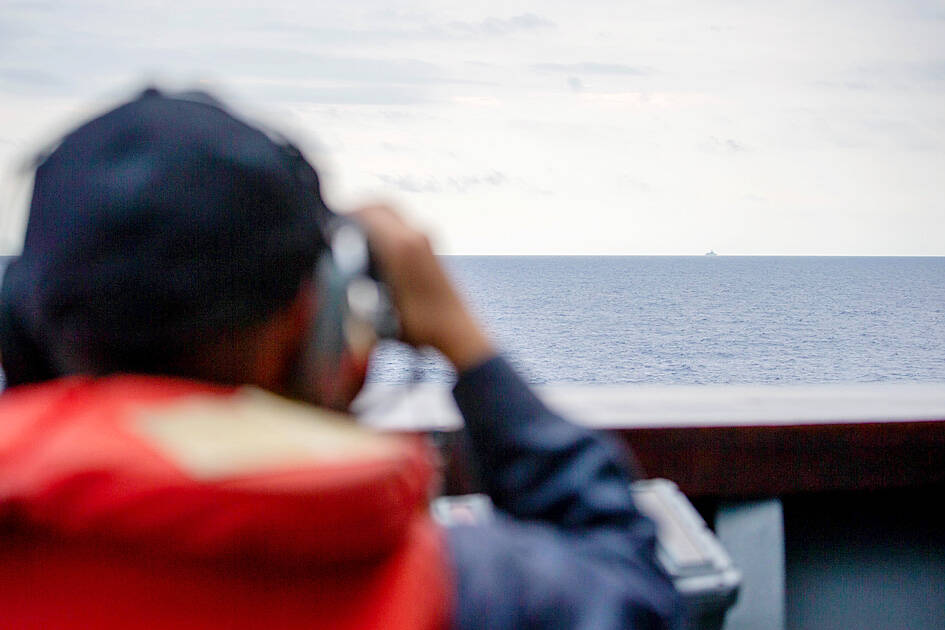China might seek to isolate Taiwan and weaken its economy through a “quarantine,” which would make it difficult for the US to respond and force Taipei to negotiate on unification, CNN reported on Saturday.
Chinese President Xi Jinping’s (習近平) “increasingly bellicose actions” toward Taiwan have heightened concerns that Beijing would use its military against Taiwan, it said, citing a report by think tank the Center for Strategic and International Studies (CSIS).
However, China might choose to initiate a quarantine, rather than a military invasion of Taiwan, to avoid US involvement, it said.

Photo: Ministry of National Defense via EPA-EFE
“A quarantine [is] a law enforcement-led operation to control maritime or air traffic within a specific area while a blockade is foremost military in nature,” CNN said, citing the report.
International law considers a blockade an act of war, but “a quarantine led by China’s coast guard is not a declaration of war against Taiwan,” which means that US involvement could be interpreted as the Washington initiating war with China, it said.
Such a quarantine would be costly for China to maintain, but potentially could deter operators from servicing Taiwan, which would cut off the nation’s population from energy and other supplies, it said.
Furthermore, the China Coast Guard has 150 ocean-going vessels and 400 smaller ones, while the Coast Guard Administration has only 10 ocean-going ships and about 160 smaller ones, it said.
Taiwan lacks the numbers to push back a quarantine, it said.
The think tank report, coauthored by Bonny Lin, Brian Hart, Matthew Funaiole, Samantha Lu and Truly Tinsley, said the Chinese People’s Liberation Army (PLA) might only play an auxiliary or support role during such a quarantine, to avoid it being seen as a blockade.
The actions taken by Beijing to isolate Taiwan during a quarantine might be relatively limited, but they would still have the effect of strangling Taiwan economically, they said.
“Limited search and/or seizure actions have an effect on flights to Taiwan as a quarantine can easily be extended to the air,” CNN said.
“Meanwhile, a quarantine, rather than a blockade, would not require China to close or restrict access to the Taiwan Strait… [meaning] Washington” could not justify intervention by arguing it was “preserving freedom of navigation in an international waterway,” it said
China might not even use the word “quarantine” before isolating Taiwan, which would let it keep the operation more low-key, it said.
However, the importance of Taiwan’s exports to the world economy would make such a quarantine costly and risky for China, it said, citing one former US military official.
“Maintaining the quarantine will be expensive and time consuming,” former director of operations at the US Pacific Command’s Joint Intelligence Center Carl Schuster said.
“Taipei won’t give up in under 60 days. Can Beijing sustain the effort and possible international reaction for that long?” he asked.
Separately, Royal United Services Institute senior research fellow Sidharth Kaushal told CNN that “a quarantine could also push Taiwan’s government to declare independence, something Beijing has repeatedly said would likely bring armed conflict.”
“This would then leave the [Chinese Communist Party] with the options of either escalation or a major setback,” he said.

Chinese spouse and influencer Guan Guan’s (關關) residency permit has been revoked for repeatedly posting pro-China videos that threaten national security, the National Immigration Agency confirmed today. Guan Guan has said many controversial statements in her videos posted to Douyin (抖音), including “the red flag will soon be painted all over Taiwan” and “Taiwan is an inseparable part of China,” and expressing hope for expedited reunification. The agency last year received multiple reports alleging that Guan Guan had advocated for armed reunification. After verifying the reports, the agency last month issued a notice requiring her to appear and explain her actions. Guan

The Kaohsiung Tourism Bureau audited six hotels in an effort to prevent price gouging ahead of Korean band BTS’ concert tour in the city scheduled for Nov. 19, 21 and 22 this year. The bureau on Friday said that the audits — conducted in response to allegations of unfair pricing posted on social media — found no wrongdoing. These establishments included the local branches of Chateau de Chine, Hotel Nikko, My Humble House, and Grand Hai Lai, it said, adding that the Consumer Protection Commission would have penalized price gougers had the accusations been substantiated. The bureau said the Tourism Development Act

BACK TO WINTER: A strong continental cold air mass would move south on Tuesday next week, bringing colder temperatures to northern and central Taiwan A tropical depression east of the Philippines could soon be upgraded to be the first tropical storm of this year, the Central Weather Administration (CWA) said yesterday, adding that the next cold air mass is forecast to arrive on Monday next week. CWA forecaster Cheng Jie-ren (鄭傑仁) said the first tropical depression of this year is over waters east of the Philippines, about 1,867km southeast of Oluanpi (鵝鑾鼻), and could strengthen into Tropical Storm Nokaen by early today. The system is moving slowly from northwest to north, and is expected to remain east of the Philippines with little chance of affecting Taiwan,

The military yesterday said it has located the flight data recorder, or black box, of an F-16V jet that disappeared off eastern Taiwan earlier this month, and it would soon deploy a salvage team to try to retrieve it. Air Force Command Headquarters said that while it had pinned down the location of the black box, it was still searching for the aircraft’s sole pilot, air force Captain Hsin Po-yi (辛柏毅). Without providing details, the air force said it had located the black box days after detecting some intermittent signals and would now engage a team of professionals to retrieve it. The air